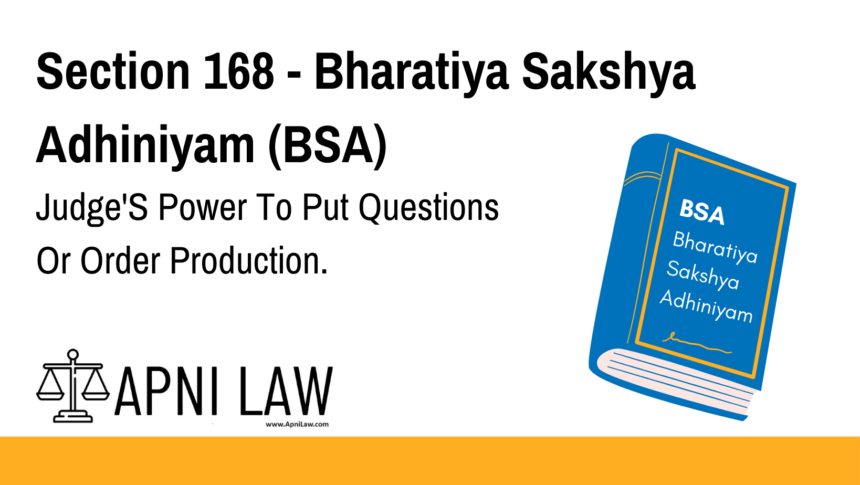Code: Section 168 BSA
The Judge may, in order to discover or obtain proof of relevant facts, ask any
question he considers necessary, in any form, at any time, of any witness, or of the parties
about any fact; and may order the production of any document or thing; and neither the
parties nor their representatives shall be entitled to make any objection to any such question
or order, nor, without the leave of the Court, to cross-examine any witness upon any answer
given in reply to any such question:
Provided that the judgment must be based upon facts declared by this Adhiniyam to
be relevant, and duly proved:
Provided further that this section shall not authorise any Judge to compel any witness
to answer any question, or to produce any document which such witness would be entitled
to refuse to answer or produce under sections 127 to 136, both inclusive, if the question
were asked or the document were called for by the adverse party; nor shall the Judge ask
any question which it would be improper for any other person to ask under section 151 or
152; nor shall he dispense with primary evidence of any document, except in the cases
hereinbefore excepted.
Explanation of Section 168 BSA
Section 168 of the Bharatiya Sakshya Adhiniyam (BSA) allows Judges to play an active role in uncovering the truth during a trial. This section empowers Judges to ask questions and order the production of documents to gather relevant facts. The provision ensures that the trial process is thorough and efficient.
Key Provisions:
- Judge’s Authority to Question:
A Judge may ask any question, at any time, to any witness or party involved. This helps in clarifying or discovering relevant facts. - Power to Order Document Production:
Judges can order the production of documents or items that may be relevant to the case, ensuring that all necessary evidence is considered. - No Objections to Judge’s Orders:
Parties cannot object to questions or orders made by the Judge. This ensures that the Judge can carry out their role effectively without being hindered by procedural arguments. - Limits on Cross-Examination:
Parties cannot cross-examine a witness about the answers given to questions posed by the Judge, unless the Court grants permission. This ensures that the trial remains orderly and focused on relevant facts. - Exceptions to Judicial Power:
The Judge cannot compel a witness to answer questions or produce documents if the witness is legally entitled to refuse. Additionally, the Judge must not ask questions that are improper or dispense with primary evidence inappropriately.
Illustration
Example 1: Clarifying a Witness’s Testimony
In a case, a witness provides unclear testimony. The Judge steps in and asks additional questions to clarify the witness’s statement, ensuring that the facts are properly understood.
Example 2: Ordering Document Production
A party claims that a contract is crucial for their case but refuses to present it. The Judge orders the production of the document, ensuring all relevant evidence is considered for a fair judgment.
Example 3: Restrictions on Cross-Examination
A Judge’s question reveals new information from a witness. The opposing party cannot cross-examine the witness immediately, unless the Judge permits, maintaining the order of the trial.
Common Questions and Answers on Section 168 BSA
- Can a Judge ask any question during the trial?
- Yes, the Judge has the authority to ask any question necessary to uncover relevant facts.
- Can parties object to the Judge’s questions?
- No, parties or their representatives cannot object to questions posed by the Judge.
- Can a Judge force a witness to answer questions they are allowed to refuse?
- No, the Judge cannot compel a witness to answer questions or produce documents that the witness is entitled to refuse under sections 127 to 136 of the BSA.
- Can the Judge dispense with primary evidence of a document?
- No, the Judge cannot dispense with primary evidence unless certain exceptions apply.
- What is the role of the Judge in the discovery of evidence?
- The Judge actively participates in discovering relevant facts by asking questions and ordering the production of evidence.
Conclusion
Section 168 of the Bharatiya Sakshya Adhiniyam (BSA) grants Judges significant power to help uncover the truth during a trial. By allowing Judges to ask questions and order evidence production, the provision ensures a fair and efficient judicial process. However, the Judge’s powers are not unlimited, and they must respect legal boundaries, ensuring that the trial remains just and transparent.
For more legal insights and detailed explanations of other sections, visit ApniLaw’s comprehensive resources.








